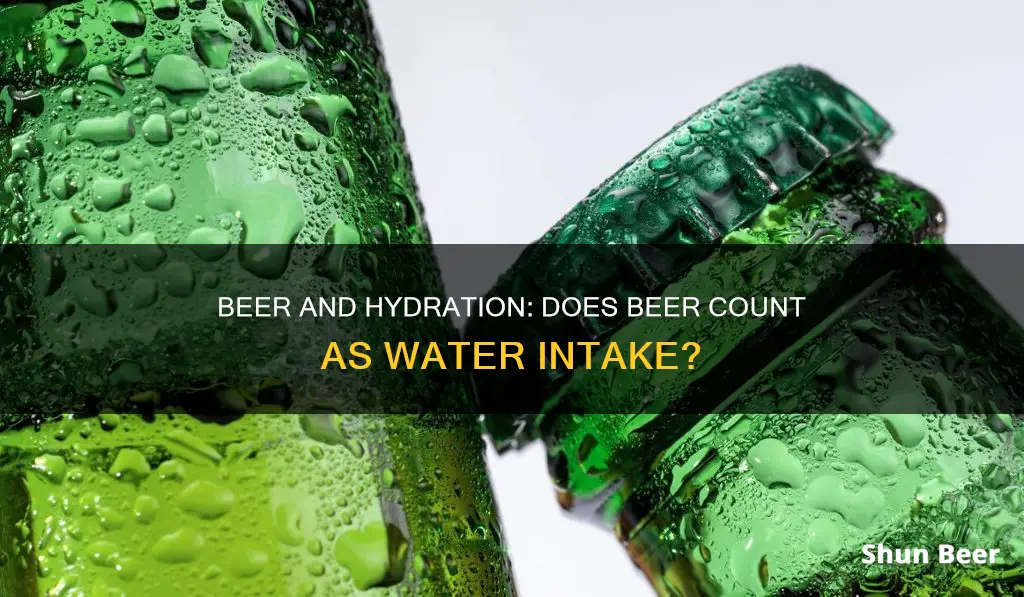
Beer is mostly water—approximately 95% water, in fact. So, does drinking beer count as water intake?
The short answer is no. While beer can be hydrating, the alcohol in beer is a diuretic, which makes you urinate more, leaving less fluid in your blood and potentially leading to dehydration. The more you drink, the more dehydrated you may become.
| Characteristics | Values |
|---|---|
| Percentage of beer that is water | 95% |
| Alcohol's effect on hydration | Dehydrating |
| Alcohol's effect on the body | Diuretic |
| Alcohol's effect on the body | Removes fluids from the blood |
| Alcohol's effect on the body | Decreases the amount of vasopressin in the body |
| Alcohol's effect on the body | Leads to dehydration |
| Beer's hydration level compared to other alcoholic drinks | Least dehydrating |
| Beer's hydration level compared to water | Not hydrating |
What You'll Learn

Beer is 95% water
Beer is mostly water. In fact, water accounts for up to 95% of beer's content. The mineral content of water can be manipulated and adjusted according to the requirements of the beer style being brewed.
The quality of brewing water is extremely important, and beer is about 90 to 95% water. Inside the average brewhouse, it takes seven gallons of water to produce one gallon of beer. At less efficient breweries, the ratio can go as high as 10 to one. Cleaning uses the most water—three to eight gallons per gallon of beer—and additional water is needed for cooling and packaging.
Beer is not a suitable replacement for water in your diet. If you swore off plain water altogether, you’d likely die of dehydration in a matter of days or weeks, depending on the strength and volume of beer consumed. The alcohol in beer has a diuretic effect, making it a net negative in terms of hydration under most conditions.
That being said, some studies have shown that beer can be a suitable rehydration drink. A 1996 study in The Journal of Applied Physiology found that beverages with low alcohol concentrations have "a negligible diuretic effect" when consumed in a state of exercise-induced dehydration. The study concluded that recovering from dehydration is effectively the same whether you're rehydrating with water or a beverage containing up to 2% alcohol. However, drinks containing 4% alcohol tend to delay the recovery process.
Beer Drinking: When to Stop and When to Pour
You may want to see also

Alcohol is a diuretic
Vasopressin is a crucial hormone that tells your kidneys to reabsorb water if your body needs it, rather than flush it out through the bladder. However, alcohol interferes with this natural signal by switching it off, allowing the bladder to fill up with urine, which ultimately leads to an increased need to urinate.
The consequence of alcohol's diuretic effect is that we lose more liquid through our urine than we take in, putting us at risk of dehydration. This is why it's important to replace lost fluids by drinking water if we choose to consume alcohol. Dehydration can lead to serious health issues such as confusion and seizures and can worsen hangover symptoms.
The only way to avoid the diuretic effect of alcohol is to abstain from drinking it. To maintain proper hydration, it is recommended to follow guidelines such as those from the UK Chief Medical Officers, which advise no more than 14 units of alcohol per week, incorporating several drink-free days and avoiding binge drinking.
The diuretic effect of alcohol has been observed in various studies. One study on elderly men found that moderate amounts of stronger alcoholic beverages, such as wine and spirits, resulted in a short-term and small diuretic effect, while weaker alcoholic beverages like beer did not show a significant difference. Another study on males in euhydrated and hypohydrated states suggested that hypohydration blunted the diuretic action of a small dose of alcohol.
Drinking Non-Alcoholic Beer: Safe Driving?
You may want to see also

Beer is the least dehydrating alcoholic drink
Alcohol is a diuretic, which means it causes the body to remove fluids from the blood through the renal system at a much faster rate than other liquids. This can lead to dehydration, especially if you don't drink enough water with your alcoholic drink of choice.
However, some alcoholic drinks are less dehydrating than others. The lower the alcohol content in a beverage, the less of a diuretic it is. This makes beer, with its relatively low alcohol content, the least dehydrating alcoholic drink. The average beer has between 3-7% alcohol content in a 12-ounce serving, while a 5-ounce glass of wine can have up to 14% alcohol content, and a single shot of liquor can contain up to 70% alcohol.
However, it's important to note that drinking multiple beers in a short period can lead to dehydration. The liver takes about an hour to process a single serving of beer, so drinking several beers in an hour will have the same dehydrating effect as taking a shot of liquor. To stay hydrated while drinking beer, it's recommended to drink slowly and to alternate between alcohol and water.
Beer and Vodka: Mixing Alcohol Safely
You may want to see also

Beer is not a health food
While beer does contain some vitamins and minerals, it is not a health food.
Firstly, beer is an alcoholic drink, and alcohol is a drug with a high potential for dependency. Heavy drinking carries many risks, including a significantly increased risk of death from all causes. Research shows that heavy drinking can reduce life expectancy by up to 28 years. Alcohol is also a huge dehydrator.
Secondly, beer is not a good source of nutrients when compared with whole foods like fruits and vegetables. For example, you would need to drink massive amounts of beer to reach your daily nutrient requirements.
Thirdly, beer is often referred to as "liquid bread" because of its high calorie count. A standard 12-ounce (355-mL) beer contains around 153 calories, so consuming multiple drinks can contribute to weight gain.
Finally, beer is not as hydrating as water. While it is true that all liquids count towards hydration, and that about 20% of our fluid intake comes from food, water is still the best way to stay hydrated.
Drinking Beer in Public: Las Vegas Laws and Where to Enjoy
You may want to see also

Coffee and tea count towards hydration
Coffee and tea do count towards your daily water intake. While it was previously believed that the diuretic effects of caffeine in these drinks could lead to dehydration, this has been debunked. Research has shown that the diuretic effects are mild, and coffee and tea are not dehydrating when consumed in moderation.
That being said, it's important to note that coffee and tea are not as hydrating as a glass of water. Physician Catherine Waldrop suggests that one cup of coffee or tea should be counted as half a cup of water. This is because caffeine acts as a diuretic, which can increase the urge to urinate. Integrative medicine doctor Bindiya Gandhi also warns that drinking multiple cups of coffee or tea without also drinking water could lead to dehydration. Therefore, it's important to balance your coffee and tea intake with water consumption to ensure adequate hydration.
Additionally, different types of coffee and tea will have varying effects on hydration levels. For example, black coffee or tea will be less hydrating than a latte or a cup of tea with milk or a non-dairy alternative. This is because milk has been shown to promote rehydration, even more so than some sports drinks. However, it's important to opt for unsweetened lattes, as added sugar can affect optimal hydration.
In conclusion, while coffee and tea do count towards your daily water intake, they should not be relied upon as the sole source of hydration. Drinking water is still the best way to stay properly hydrated, as it has no sugar, no calories, and contains essential natural minerals that our bodies need to function optimally.
Beer and the Bible: Drinking Guidelines
You may want to see also
Frequently asked questions
Beer is mostly water (95% to be precise), but it doesn't count as water intake because it's dehydrating. Alcohol acts as a diuretic, removing fluids from your blood through your renal system more quickly than other liquids.
There is no hard and fast rule for how much water you should drink per day. It depends on your body size, activity level, temperature, and how much you're sweating. The best advice is to listen to your body and drink water when you're thirsty.
Signs of dehydration include feeling tired, sluggish, thirsty, and having a headache. You may also feel irritable and cranky.







